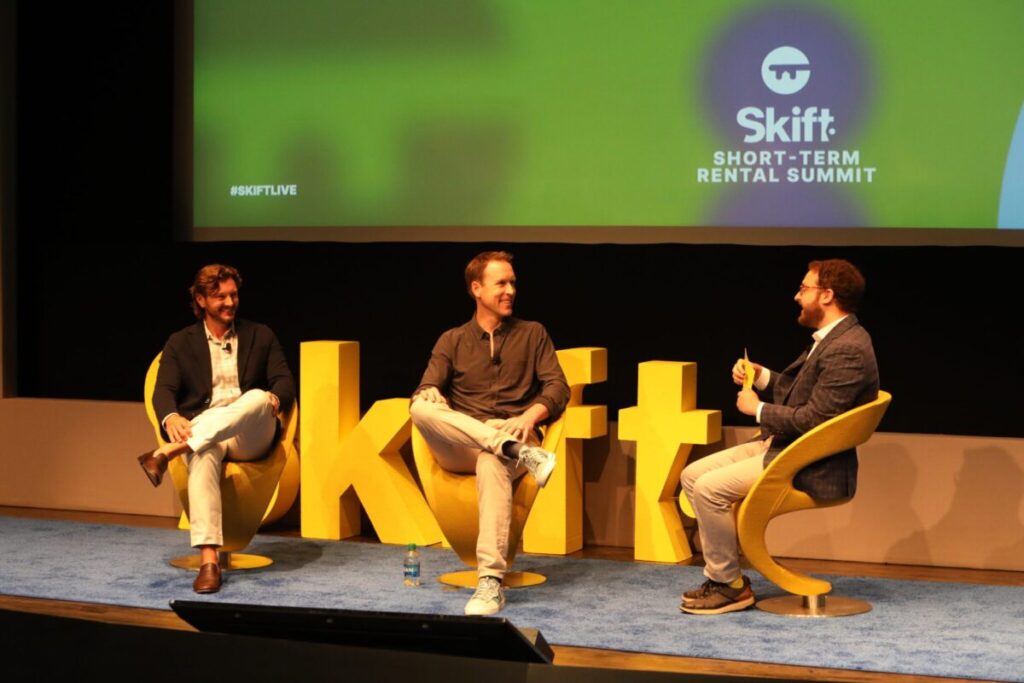Skift Take
Justin Dawes
Technology is essential to the future of a successful vacation rental business, but it’s not the whole solution.
“You're not vacuuming your carpets,” says Brian Egan, co-founder and CEO of Evolve, a short-term rental management company that manages 35,000 properties.
“The key is to leverage technology where it's needed and remain focused on human-led service everywhere else,” Egan said, speaking at the Skift Short-Term Rental Summit in New York City on Wednesday.
He was joined by Dustin Abney, CEO of Portoro, a similar company with about 300 properties in Texas, Florida, Virginia and Oregon, to weigh in on the technology topic.
Evolve and Portoro are property management companies with consumer-facing brands and technology platforms that allow guests to book stays. Competitors include companies like Vacasa and Sonder.
Where technology is essential
For a property management company to scale properly, the fundamental techniques of distribution, pricing, and ensuring your properties are visible in the right channels are key.
“It's not glamorous, but it's absolutely essential. Nothing like this existed when we started over 10 years ago,” Egan said.
“We make hundreds of millions of price changes a year – over 30,000 price changes per property per year. Before, I had to log into the extranet and manually change the price on Vrbo.”
Technology limitations
Some of Evolve's competitors have struggled to become profitable despite having strong technology platforms.
“Technology is easy to scale up, but if you're a very operationally intensive, capital intensive business, technology isn't going to help you become more profitable,” Egan said. “If you have to buy real estate, master lease it, buy furniture and fixtures and equipment, hire thousands of housekeepers, technology isn't going to solve those problems.”
He highlighted that Evolve partners with local companies for cleaning and other on-site work, similar to the business model of major hotel brands.
This type of model is even more important for a company like Evolve because no two properties are the same.
“It's not possible to apply enough technology to figure out how to clean 35,000 completely different kitchens,” he said.
Don’t force technology on your customers
While consumer technology is convenient, Abney said guests don't always want to download an app — sometimes they just want relevant information sent directly to them via text.
“I do think there are cases where too much technology can have a negative impact, or push the guest or the consumer in a direction they don't want to go in,” Abney says. “When you think about turnkey apps in the home, I think there are touch points that can really make for a great experience.”
AI in Vacation Rentals
Both Abney and Egan believe it’s important to integrate AI into operations to automate repetitive tasks, whether they’re back-office or consumer-facing.
“Anything that's software-driven in business will and should involve AI, and that's what will happen for us,” Egan said.
This includes pricing algorithms, housekeeper schedules, guest communications, and more.
“We're thinking about how to implement that, but we don't have the AI technology at the moment,” Abney said.
Technology gaps for homeowners
Portoro has acquired most of its homeowner customers by acquiring smaller property management companies, and the company is working on developing an app that will give homeowners more visibility into what's happening with their properties, Abney said.
“I truly believe that in this industry, homeowners are left on the sidelines most of the time and not informed about what's going on at their properties,” Abney said.
This kind of technology can't actually be purchased from a vendor, he says.
“This is a big gap, but nobody is focusing on it, and we see this as core to our technology strategy,” Abney said.
Photo credit: From left: Poltoro CEO Dustin Abney, Evolve CEO Brian Egan, and Skift Research head Seth Borko

